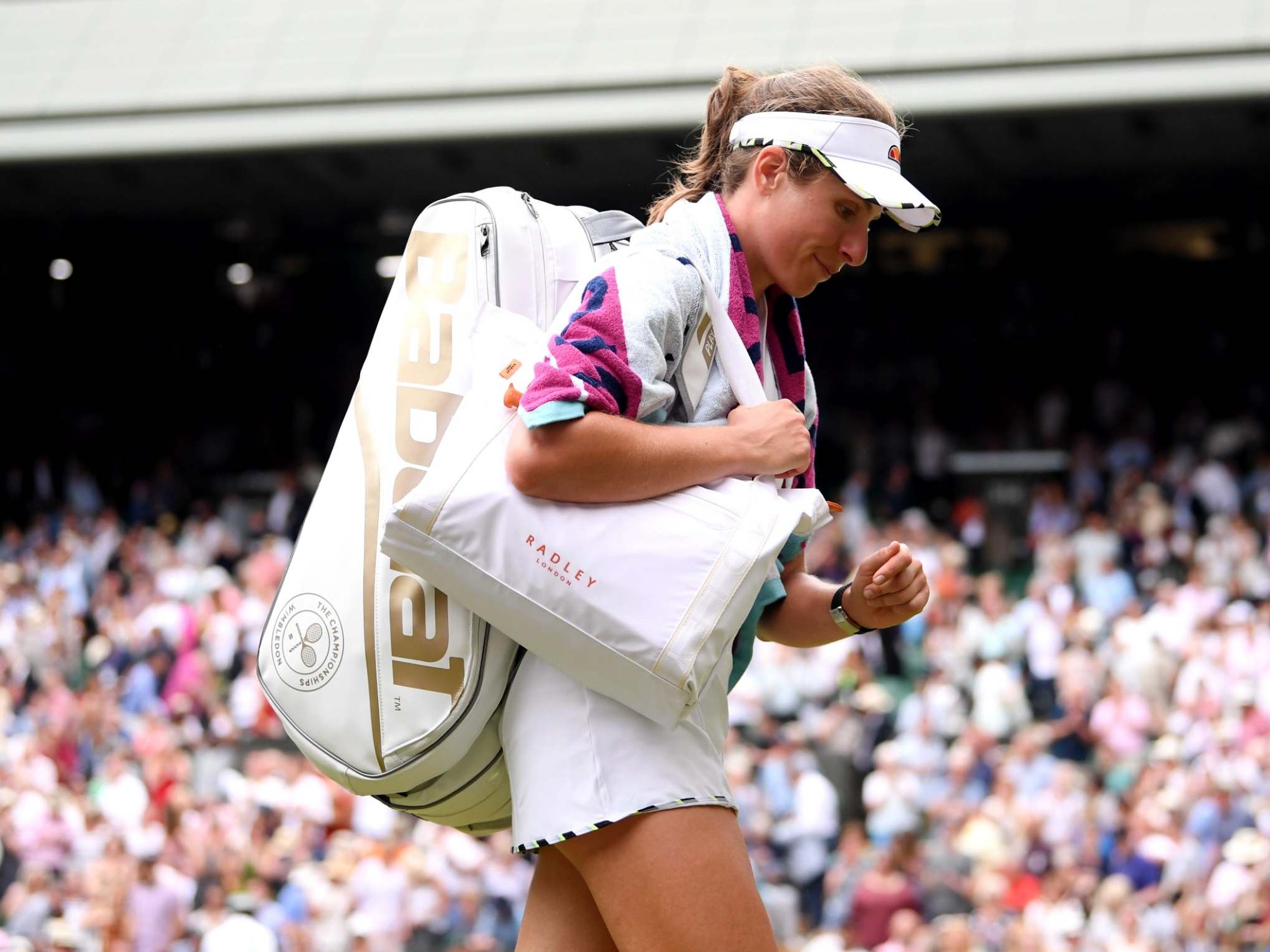Wimbledon 2019: Johanna Konta must learn from Grand Slam losses or risk forever repeating them
The Brit No 1's career is back on an upward curve but she must learn some significan lessons from her most recent defeat


It might take Johanna Konta a day or two to get over her resounding defeat to Barbora Strycova in the Wimbledon quarter-finals here on Tuesday, but the British No 1 should be consoled by some revealing statistics.
At the end of last year’s Wimbledon, when she lost to Dominika Cibulkova in the second round, Konta dropped from No 24 in the world rankings to No 50, which was her lowest position for nearly three years. In contrast, when the rankings are updated next week Konta is expected to climb from No 18 to No 14, which will be her highest position for 16 months.
Konta’s rise up the world order has come after a run which is illuminated by another telling statistic. Since the start of the clay-court season in April, the 28-year-old Briton has played 29 matches, which is more than any other player on the main tour. The number of matches is a reflection of her success: during that run she reached the finals of the clay-court events in Rabat and Rome, made the semi-finals of the French Open and rounded off a productive grass-court season with her run to the quarter-finals here.
The pity for Konta is that her two most disappointing results in that time came in the semi-finals at Roland Garros and in the quarter-finals here. Both were losses to lower-ranked players and both followed significant victories. In Paris Konta lost to Marketa Vondrousova (world No 38) after beating Sloane Stephens (world No 7) in the quarter-finals and her loss here to Strycova (world No 54) followed wins over Stephens and Petra Kvitova (world No 6).
While Konta and her entourage – and in particular her mind coach Lorenzo Beltrame – might want to revisit how she handles the biggest matches on the biggest stages, the fact is that Konta’s career is back on an upward curve after a difficult 18 months following her run to the semi-finals here two years ago.
Since recruiting Dimitri Zavialoff as her coach at the end of last year Konta has added variety to her game, which in the past had been too one-dimensional. Her clay-court form in particular has been remarkable given that she had never won a main-draw match at Roland Garros until this year.
Anne Keothavong, Britain’s Fed Cup captain, has seen a big change in Konta in recent months. “I see someone who is more sure of herself, more sure of how to handle herself in difficult situations, someone who trusts herself that even if things aren’t immediately going to plan that she can figure a way back,” Keothavong told The Independent.
While Zavialoff has clearly been a factor in Konta’s improvement, Keothavong stressed: “I think it’s been a great team effort. Ultimately when she’s out on court it’s Jo who has to work things out and do things. It’s noticeable that she doesn’t look up to her box as much as she used to. She’s in her zone. With all the matches she’s won this year it’s given her a huge amount of confidence.”
Konta plans to take a well-deserved break before returning to competition in Toronto in four weeks’ time. She is then likely to play in Cincinnati before heading to New York and the US Open, which starts at the end of next month. All those tournaments are on hard courts, which has usually been her best surface. Despite her recent successes on clay and grass, Konta has won all three of her tour-level titles on hard courts.
The one doubt that might be at the back of Konta’s mind is whether she needs to do more work on her mental approach to big matches at the business end of the most important events.

Her best five runs in Grand Slam tournaments have all ended in straight-sets defeats: to Angelique Kerber and Serena Williams in the Australian Open 2016 semi-finals and 2017 quarter-finals respectively; to Venus Williams and Strycova in the Wimbledon 2017 semi-finals and 2019 quarter-finals respectively; and to Vondrousova in the 2019 French Open semi-finals.
While the manner of her defeat to Vondrousova in Paris last month, when she let slip 5-3 leads in both sets, suggested that Konta had suffered a crisis of confidence, her loss here to Strycova was more of a failure on a tennis level as she appeared unable to cope with Strycova’s funky variations of pace and spin.
The reporter whose question Konta found patronising in her post-match press conference on Tuesday was pointing out some indisputable facts. In losing to Strycova, Konta had made 34 unforced errors to her opponent’s nine. Most tennis players will tell you that they learn more from their losses than from their victories. For Konta’s own sake it is to be hoped that the same applies to the British No 1.
Join our commenting forum
Join thought-provoking conversations, follow other Independent readers and see their replies
Comments
Bookmark popover
Removed from bookmarks